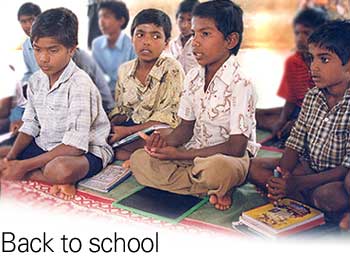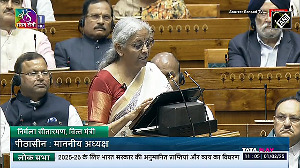
Part I: Bonded to the loom
Part III: The road to a better life
Away from urban India, it is easy to comprehend what a powerful role the government and its bureaucrats can play in changing the quality of an ordinary Indian's life.
In Karnataka's Magadi district -- it was once a hub of the state's thriving silk industry and hosted numerous factories where silk thread was reeled, wound and twisted -- the power and resources available to the government are startlingly clear.
The district collector is the arbiter of local disputes. Factory owners who want to complain against non-governmental organisations 'forcibly' taking away their work force, composed mainly of bonded child labourers, go to the collector for 'justice'. NGO workers who are constantly being harassed by the factory owners also go to the collector for protection.
The local policeman helps the factory owners intimidate the parents of rescued child labourers and bring them back to work. He also accompanies NGOs on raids to rescue these same children.
The labour commissioner decides whether a child goes to a government school or works in a silk factory.
Till 1997, the government was in denial about the fact that Magadi's silk industry thrived on child labour. The department of sericulture, on the other hand, had accepted the problem of children working in silk factories as a necessary evil.
But when Lukose Vallatharai, former labour commissioner, took over in 1998, the situation changed.
"Lukose's predecessor tried to deny that there was a problem of child labour in the district," says Suchitra Rao, UNICEF coordinator for the Magadi Makkala Dhwani project, "so we got no government support. But Lukose had a lot of trust in the work being done by non-governmental organisations. He sat with UNICEF and CACL [Campaign Against Child Labour, a network of 300 NGOs] to identify who could work in Magadi and rescue the bonded child labourers."
The Magadi Makkala Dhwani project began in 1998 and covers 120 villages in the district. With the help of UNICEF, and the support of the Government of Karnataka, the group has turned Magadi into a model for anti-child labour activists throughout the state.
The project works towards rescuing and rehabilitating children working in Magadi's silk factories. It also educates the community (parents and factory owners) about the violation of children's rights and hopes this will reduce and ultimately prevent the use of child labour in sericulture.
In 1998, social workers in Magadi managed to get the National Human Rights Commission to visit the area. Shocked to learn about the widespread use of child labour in sericulture, the NHRC sent a note to the state government, which in turn questioned the local labour department.
That's when Vallatharai turned to UNICEF for help. The Magadi Makkala Dhwani project was born and raids against factories that used child labour began. In a year, 52 children were released.
By then, the Karnataka high court had given a judgment that listed various activities under the sericulture industry as hazardous. This meant that according to the law, children under 14 could not be put to work in the silk industry.
The Magadi Makkala Dhwani project then drew up a plan to rehabilitate the freed children. 'Bridge' programmes and residential schools were started by each of the NGOs participating in the project. Chiguru runs a hostel exclusively for girls and sends them to a nearby government school, while Vikasa and Don Bosco do the same for boys.
Typically, children drop out of school and spend up to three years working in the factories. When they are rescued, they have forgotten whatever they had learnt in the past and lag behind other school-going children of their age. The bridge programme tutors these children within their homes before they are admitted to regular government schools.
The dedication shown by the Magadi Makkala Dhwani project has borne fruit. In about three years, nearly 1,000 children have been readmitted into schools.
Ajjanahalli is about 60 kilometres from Bangalore. Off a mud road, Father Varghese Pallipuram runs a residential home called the Don Bosco Yuvakara Grama for street children, runaways and rescued children. Of the 130 boys at the home, nearly 50 are from Magadi. All of them are between eight and 16 years old; most are former labourers from the silk industry.
"Because of the harassment that they experience, the long hours at work and the stress, the children are very quiet. It takes them time to adjust after they come here," says Father Varghese.
At Don Bosco, the children are divided according to their educational levels. Those who are above 12 have the option of going for vocational training. Currently, these include tailoring and welding. Don Bosco plans to introduce agriculture, screen-printing and electrical vocational training programmes soon.
About 20km away, Vikasa runs a residential programme for boys. Housed in an abandoned factory, the children study, play and sleep in a single, wide hall. Currently, Vikasa's residential programme includes three children who used to work on the twisting machines.
The youngest, Anantha, is barely 10 years old. His family moved to Magadi from Andhra Pradesh when his father was told there was work in Magadi that even children could do.
One year after coming to Magadi, Anantha's father died and his mother became an alcoholic. In 1997, the family took Rs 7,000 as 'advance' from a factory owner. To repay the amount, two of Anantha's sisters were put to work. When Anantha was eight years old, he too was sent to the factory.
When one of his sisters was rescued, she brought Anantha with her.
Rehabilitating him isn't easy. Vikasa's co-ordinator for the project, Manjuswami, says the boy, who should be in class five, barely meets the educational requirements for the class 3 level.
Apart from having to counsel and deal with troubled children, the co-ordinators face a host of other problems.
Till 2001, factory owners used to come to the Vikasa home and harass the teachers. They would threaten, shout and ask for the children to be returned to their parents. The teachers complained to the local police and district collector and, soon, these incidents subsided.
Apart from teaching them, Vikasa involves its wards in activities like gardening and farming. Mint shrubs jostle with papaya trees. Radishes, pumpkins and beans are grown in little plots in the backyard. It is the children who do most of the work and the upkeep. "They have a great time digging, planting and growing things. They love the activity and playing in the fields," says Manjuswami.
The project's field co-ordinators are no rustics. All are graduates and some, like Devraj of Sankalp, hold master's degrees in social work.
For a job that requires them to live full-time with the children, teach them and heal their emotional wounds, it certainly pays very little.
Manjuswami, who has a family to support, gets about Rs 3,500 a month. For nearly two years after he got married, he used to visit his wife once in two months, travelling five hours each way. Now, she lives nearby. It is not an easy life, but they are not complaining.
"The satisfaction you get from the fact that you have been able to put four or five children through school is immense," says Manjuswami. "I don't want to trade this job for anything else, even though I have been offered work in other places."
Part I: Bonded to the loom
Part III: The road to a better life
Photo credit: Omprakash
Image: Uttam Ghosh






 © 2025
© 2025